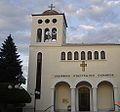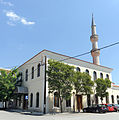| Revision as of 19:07, 1 June 2014 editGreco22 (talk | contribs)Extended confirmed users23,055 editsNo edit summary← Previous edit | Revision as of 05:39, 7 June 2014 edit undoSeptate (talk | contribs)Extended confirmed users2,303 edits Added image.Tag: Mobile editNext edit → | ||
| Line 66: | Line 66: | ||
| ==Islam== | ==Islam== | ||
| {{Main|Islam in Greece|Greek Muslims}} | {{Main|Islam in Greece|Greek Muslims}} | ||
| ], oil on canvas, 1865); this oil painting portrays ] at prayer in a ]).]] | |||
| ] are mostly of ] origin though a community of ] exists as well. The number of followers of Islam is estimated to be at 97,604 people or 0.95% of the total population, according to the 1991 census.<ref> and </ref> Immigrant Muslims are estimated between '''200,000-300,000'''.<ref name=USA>{{cite web |url=http://www.state.gov/g/drl/rls/irf/2006/71383.htm |title=International Religious Freedom Report 2006: Greece |publisher=www.state.gov |work=US Dept. of State/Bureau of Democracy, Human Rights, and Labor |date=2006-09-15 |accessdate=2007-09-15}}</ref> | ] are mostly of ] origin though a community of ] exists as well. The number of followers of Islam is estimated to be at 97,604 people or 0.95% of the total population, according to the 1991 census.<ref> and </ref> Immigrant Muslims are estimated between '''200,000-300,000'''.<ref name=USA>{{cite web |url=http://www.state.gov/g/drl/rls/irf/2006/71383.htm |title=International Religious Freedom Report 2006: Greece |publisher=www.state.gov |work=US Dept. of State/Bureau of Democracy, Human Rights, and Labor |date=2006-09-15 |accessdate=2007-09-15}}</ref> | ||
Revision as of 05:39, 7 June 2014
| Greece religiosity (2001) | ||||
|---|---|---|---|---|
| Orthodoxy (Christian) | 95% | |||
| Islam | 2.2% | |||
| Catholicism (Christian) | 1.5% | |||
| Protestantism (Christian) | 0.6% | |||
| Other | 0.7% | |||
Religion in Greece, is dominated by the Church of Greece, which is part of the wider Greek Orthodox Church. It represents the majority of the population and Greek Orthodoxy is constitutionally recognised as the "prevailing religion" of Greece (making it one of the few European countries with a state religion). Other major religions include Catholicism, Hellenic Neopaganism, Judaism, Protestantism and Islam.
According to a 2010 Eurobarometer Poll, 79% of Greek citizens believe that there is a God, whereas 16% believed in some sort of spirit or life force and 4% responded that they did not believe there is any sort of God, spirit or life force. According to a more recent survey (April 2011) conducted by Kapa Research (a major Greek polling firm) at the request of To Vima newspaper, asking Greek citizens whether they believed in God or not, 56.3% answered "yes", 20% answered "probably yes", 7.7% answered "probably no" and 13% answered "no".
Christianity
Greek Orthodoxy
Main article: Church of Greece

The Greek Orthodox Church, a member of the Eastern Orthodox Communion, is accorded the status of "prevailing religion" in Greece's constitution, and Greece is the only country in the world where an Eastern Orthodox Church is clearly recognized as a state religion. Since 1850, Greek Orthodoxy within Greece is handled by the Church of Greece. Its members comprise between 95% and 98% of the population, although recent surveys on the religiosity of Greek citizens seem to contradict these numbers.
The status of the Orthodox church as the "prevailing religion" is largely based on the role the church played for the preservation of the Greek nation through the years of the Ottoman Empire but also for the role the church played in the Greek War of Independence. As a result, many attribute to the modern Greek nation an ethnoreligious identity.
The Church of Greece is largely exempt from taxes, compared to other religious organizations. Furthermore, the mainstream Orthodox clergy's salaries and pensions are being paid for by the State at rates comparable to those of teachers. All Greek students in primary and secondary schools in Greece attend Christian Orthodox instruction, although there is an exemption system for students who do not want to attend, as long as the exemption is requested by both parents. In addition, the Constitution prohibits proselytism from other religions, but places no such restrictions on the Orthodox Church.
Catholicism
Roman Catholicism
Main article: Roman Catholicism in Greece
Indigenous Catholic Greeks number approximately 50,000 and are found all over Greece, the majority however live in the Cyclades and the Ionian Islands. The presence of Catholics in the Greek islands is mostly a heritage from the time of the Venetian domination from the Middle Ages. The Roman Catholic community has increased in size in recent years due to immigration and today number over 200,000.
Greek Catholicism
Main article: Greek Byzantine Catholic ChurchCatholic Greeks of the Byzantine Rite (Uniates) number approximately 5,000 and mostly live in Athens.
Protestantism
Main articles: Protestantism in Greece and Pentecostalism
Protestants, including Greek Evangelical Church and Free Evangelical Churches, stand at about 30,000. Free Apostolic Church of Pentecost Founded by Dr. Leonidas Feggos in 1965. The belief of the Greek Pentecostal Church is based upon the Bible. It is in agreement with the "Approved" Creed as determined by the two Ecumenical Church hi Councils. Previously the official church, Eastern Orthodox, and the State reluctantly gave permission for Pentecostal churches to operate legally. The process of receiving permission from the Ministry of Education and Religion to operate as a church is becoming easier. Assemblies of God, International Church of the Foursquare Gospel and other Pentecostal churches of the Greek Synod of Apostolic Church have 12,000 members. Independent Free Apostolic Church of Pentecost is the biggest Protestant denomination in Greece with 120 churches. There are not official statistics about Free Apostolic Church of Pentecost, but the Orthodox Church estimates the followers in 20,000.
Armenian Church
See also: Armenians in Greece
The presence of Armenians in Greece dates back centuries (from the Byzantine period), when Armenians settled in Thessalia, Macedonia, Thrace and the islands of Crete and Corfu for various reasons such as war or business.
The Armenians in Greece acquired the character of a community after the 1920s, when 70,000 to 80,000 survivors of the Armenian Genocide fled to Greece. Today, immigration to North America has diminished the Armenian population of Greece. The number now counts for roughly 20,000-35,000 Greco-Armenians.
Hellenic Polytheism
Main articles: Hellenism (religion), Supreme Council of Ethnikoi Hellenes, and Ancient Greek religionAbout 13,000 people are members of the Supreme Council of Ethnikoi Hellenes, the foremost organisation of Hellenism, the restoration of the traditional ethnic religion of the Greeks. Over 100,000 people are "sympathisers".
Judaism
Main article: History of the Jews in GreeceThe Jewish community in Greece currently amounts to roughly 7,500 people, concentrated mainly in Athens, Thessaloniki, Larissa, Volos, Chalkis, Ioannina, Trikala and Corfu, while very few remain in Kavala and Rhodes. It is composed largely of two groups, the Romaniotes, Jewish communities dating back to Antiquity, and the Ladino-speaking Sephardim, who arrived from Spain and settled chiefly in Thessaloniki during Ottoman times.
Islam
Main articles: Islam in Greece and Greek Muslims
Indigenous Turks and Muslims in Greece are mostly of Turkish origin though a community of Greek Muslims exists as well. The number of followers of Islam is estimated to be at 97,604 people or 0.95% of the total population, according to the 1991 census. Immigrant Muslims are estimated between 200,000-300,000.
Buddhism
See also: Greco-BuddhismThe number of the followers is not so high amongst the Greeks but it has increased during the last decades because of the immigration of people from East Asia in Greece. Today there are three religious centers, in Athens, Thessaloniki and Corinth.
Hinduism
Main article: Hinduism in Greece See also: Indo-GreeksHinduism in Greece has a small following. There is a small Hindu community in Athens. There are 25 PIOs and 12 NRIs in the city. On March 1, 2006, the Greek government passed a law allowing cremation. The law was welcomed by the Indian community in Athens.
During the last decades Yoga is gaining popularity, especially Satyananda Yoga and Sahaja Yoga.
Other faiths or dogmas
Other minor faiths in Greece include Jehovah's Witnesses (who number about 30,000), Seventh-day Adventists, Mormons and Scientologists. Groups that constitute less than 1 percent of the population includes Baha'is.
Gallery
-
 Saint Andrew Church of Patras
Saint Andrew Church of Patras
-
Catholic church of Thessaloniki
-
 Catholic (Capuchin) church of Chania
Catholic (Capuchin) church of Chania
-
 Evangelical church in Katerini
Evangelical church in Katerini
-
Monastir Synagogue (Thessaloniki)
-
 Beth Shalom Synagogue
Beth Shalom Synagogue
-
 Anglican Church of Saint Paul in Athens (arch. Stamatios Kleanthis)
Anglican Church of Saint Paul in Athens (arch. Stamatios Kleanthis)
-
 Ritual performed by Supreme Council of Ethnikoi Hellenes
Ritual performed by Supreme Council of Ethnikoi Hellenes
-
 Eski Mosque, Komotini
Eski Mosque, Komotini
See also
- Timeline of Orthodoxy in Greece
- Greek Evangelical Church
- Religion in ancient Greece
- Religion by country
References
- https://www.cia.gov/library/publications/the-world-factbook/geos/gr.html
- The newest polls show about 20% Greek citizens being irreligious which is much more than 1%. Ultimately, the statistics are disputed until the results of the new census.
- ^ "Greece". The World Factbook. Retrieved 2007-09-15.
- ^ "Special Eurobarometer, biotechnology, page 204" (PDF). Fieldwork: Jan-Feb 2010.
{{cite web}}: Check date values in:|date=(help) - To Βήμα - Πιστεύουμε αλλά δεν εκκλησιαζόμαστε
- ^ "Religious Freedom in Greece (September2002)" (RTF). Greek Helsinki Monitor Minority Rights Group - Greece. Retrieved 2007-09-15.
- "Executive Summary Discrimination on the grounds of religion and belief GREECE" (PDF). Dr Ioannis Ktistakis & Dr Nicholas Sitaropoulos. ec.europa.eu. 2004-06-22. Retrieved 2007-04-14.
- "International Religious Freedom Report 2007: Greece". US Dept. of State/Bureau of Democracy, Human Rights, and Labor. www.state.gov. 2006-09-15. Retrieved 2007-04-14.
- Synod of Apostolic Church of Christ
- Church addresses from the Official Site - in Greek
- Orthodox estimate - in greek
- Newstatesman - The ancient gods of Greece are not extinct
- Telegraph.co.uk - Modern Athenians fight for the right to worship the ancient Greek gods
- http://www.guardian.co.uk/world/2007/feb/01/religion.uk
- Short History Of The Jewish Communities In Greece (pdf), publicized by the Central Board of Jewish Communities in Greece
- Υπουργείο Εξωτερικών, Υπηρεσία Ενημέρωσης: Μουσουλμάνικη μειονότητα Θράκης and Ελληνική Επιτροπή για τη διαχείρηση των υδατικών πόρων: Στοιχεία από την πρόσφατη απογραφή του πληθυσμού
- "International Religious Freedom Report 2006: Greece". US Dept. of State/Bureau of Democracy, Human Rights, and Labor. www.state.gov. 2006-09-15. Retrieved 2007-09-15.
- http://www.watchtower.org/e/statistics/worldwide_report.htm
- H ΕΚΚΛΗΣΙΑ ΤΗΣ ΕΛΛΑΔΟΣ: Επιτροπές της Ιεράς Συνόδου - ΣΥΝΟΔΙΚΗ ΕΠΙΤΡΟΠΗ ΕΠΙ ΤΩΝ ΑΙΡΕΣΕΩΝ
Notes
- US Department of State Country Reports on Human Rights Practices - 2006: Greece
- Tomkinson, John L., Between Heaven and Earth: The Greek Church, Anagnosis (Athens, 2004) ISBN 960-87186-5-1
| Religion in Europe | |
|---|---|
| Sovereign states |
|
| States with limited recognition | |
| Dependencies and other entities | |
| Other entities | |